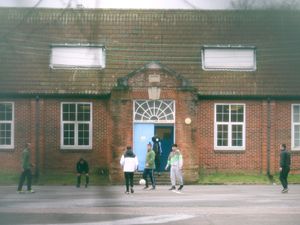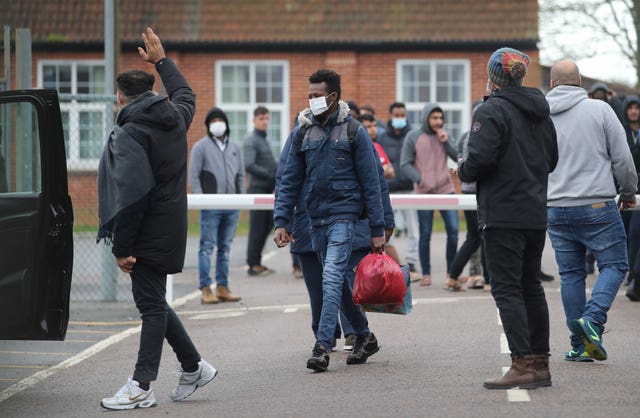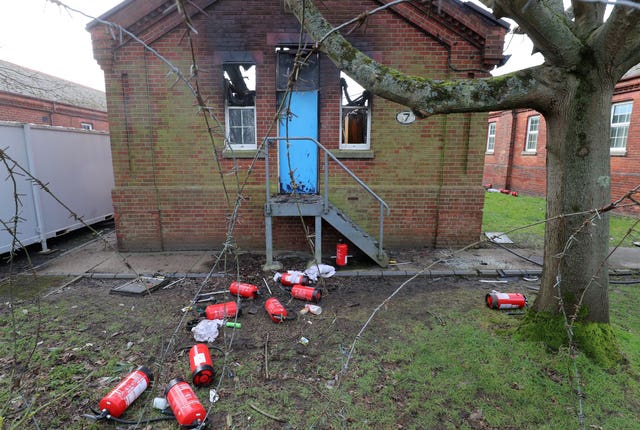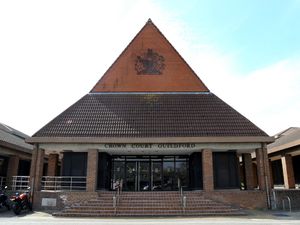Army barracks housing asylum seekers should be closed immediately, lawyers say
Lawyers representing six men challenging asylum seekers being housed at a former army barracks say the Home Office must now ‘close down the barracks’.

Lawyers representing six asylum seekers previously housed at a former army barracks have called on the Home Office to “immediately” close it down, after a legal challenge to “unlawful” conditions at the site was given the go-ahead.
The Napier Barracks in Kent has been used to accommodate hundreds of asylum seekers since last September, despite the Home Office being previously warned by Public Health England that it was unsuitable.
More than 100 people tested positive for coronavirus at the barracks in January, with asylum seekers left “powerless to protect themselves” because of the Home Office’s failures to “prevent the spread of Covid-19”, the High Court heard on Tuesday.
Just 63 people are still housed at the site and none are currently “under isolation”, the court also heard.

But lawyers representing the six men, all said to be “survivors of torture and/or human trafficking”, said there was “a mental health crisis” at the barracks, with four residents having attempted suicide and others having self-harmed.
They argue the Home Office is unlawfully accommodating people at the barracks, where conditions are said to pose “real and immediate risks to life and of ill-treatment”.
At a remote hearing on Tuesday, lawyers for the Home Office conceded that the majority of the men’s claims were “arguable” after documents which undermined its written defence were discovered shortly before the hearing.
The asylum seekers’ case that conditions at the barracks breached their human rights and that the Home Office has breached its duty to provide adequate accommodation will be considered at a full hearing in April.
Sue Willman, a solicitor at Deighton Pierce Glynn which represents four of the claimants, said after the hearing: “Refugees arriving in the UK, often after experiencing torture and trafficking, have the right to be provided with basic humane accommodation.
“Disused military barracks at Napier and Penally (another former army barracks housing asylum seekers in Pembrokeshire, Wales) are far from that and now need to be closed.”

Clare Jennings, a solicitor at Matthew Gold & Co – which represents the other two claimants, welcomed the Home Office’s “11th-hour concession” and that its actions “will receive much-needed scrutiny”.
She also said her clients “have been subjected to months of intolerable living conditions”.
Her colleague Olivia Halse said: “We welcome the Secretary of State’s concession that it is arguable that our clients’ human rights have been breached as a result of the conditions in the barracks.
“It is a shame, however, that this has come at such a late stage. Hundreds of vulnerable men have been subjected to horrendous conditions in the barracks and many still remain in the barracks.
“We call on the Government to take immediate steps to close down the barracks and ensure they act in accordance with their duty to provide these asylum seekers with adequate and suitable support.”
The six men’s lawyers earlier told the court that the Home Office “knew or ought to have known of the impossibility of effective means of controlling or containing infection at the barracks”.
Shu Shin Luh, representing two of them, said there are “present and continuing” risks to asylum seekers at Napier Barracks because of the danger of Covid-19.
But, she said, the Home Office “chose to accommodate asylum seekers during a Covid-19 pandemic in accommodation against the advice of Public Health England”.
Ms Luh said asylum seekers had been “put in the barracks in these circumstances on a no-choice basis”, and were “unable to self-isolate” or “avoid close contact with someone who has tested positive”.
Asylum seekers housed at Napier Barracks “were entirely reliant on the defendant to implement measures to protect them from the risks of infection, with potential and unpredictable risks of fatalities”, she said.
Ms Luh also argued that the barracks were particularly unsuitable for vulnerable individuals.
She said: “The barbed wires and fencing, and the regime of curfew and restrictions, served as recurring triggers for flashbacks to past torture and serious ill-treatment.”
Tom Hickman QC, representing the other four claimants, said that Public Health England “warned the Home Office on September 7 2020” – before asylum seekers were moved into the barracks – that they were “not suitable for use” and said the “advice was rejected”.
He added that his clients’ underlying mental illnesses had been “triggered or exacerbated” at the barracks, where there was “a mental health crisis”.
Lisa Giovannetti QC, representing the Home Office, told the court that “by the close of play today, there will be 63 people at the site” and that none of those housed there were currently “under isolation” as a result of coronavirus.
She added: “The Home Office is currently working with the outbreak control team, which involves representatives from Public Health England and the local Kent NHS bodies, and there is a scheduled meeting with them on February 18.”
Ms Giovannetti said the Home Office was “doing everything in the meantime, pending the full hearing, to make sure the accommodation is safe and adequate in the coming weeks”.
But she also said that “the kitchens are still not working in the aftermath of the fire” at the site in January, so food was still having to be delivered to the barracks.
The full hearing of the six men’s claims is due to be heard by the High Court over two days in mid-April.
A Home Office spokesman said in a statement: “The Government provides safe, warm and secure accommodation with three nutritious meals served a day, all paid for by the taxpayer.
“Napier has previously accommodated army personnel and it is wrong to say it is not adequate for asylum seekers.
“The Home Office has worked extremely closely with Public Health England to minimise risks of coronavirus and this track record will be robustly defended in court.
“Today’s initial hearing is one step in the legal process – the Home Office has not lost or conceded the case.”





